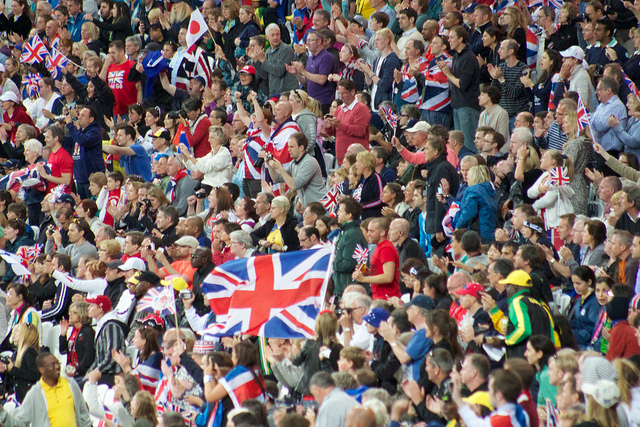As the Paralympics kick off in London tonight, SEN Journal: Online Exclusives is delighted to present our final exclusive article on the theme of nationalism, ethnicity and sport. Regular contributor Sonia Morland writes of her own experiences at the Olympic games earlier this summer, describing some of the differences in national crowds, and reflecting upon an unexpected source of national pride. Let us know what you think!
A lot has been said over the past few weeks about the revival of national pride in Britain, as our nation’s sportsmen claimed medal after medal at the Olympics. But that was not my experience of London 2012. I was working at Earls Court, where the volleyball was playing. For a British patriot, there was small comfort available there – neither the men’s nor women’s team managed to make it as far as the quarterfinals. Yet this did not stop me or my colleagues having a positive experience, as we all enjoyed watching the spectators from other countries, as they turned up to watch their nations compete in the volleyball. There was a certain enjoyment in watching nations live up to their stereotypes; I helped clean the stadium after every game and it was after the Russia vs. Poland match that we had to pick up the most empty alcohol bottles. I was especially interested by the varying efforts of different nations to showcase their national pride. Few Brits dressed up or brought flags along with them, whereas almost every Pole came entirely decked-out in the national colours of red and white. Long after the Polish team lost one match, the fans continued to sing the Polish national anthem and displayed an obvious reluctance to leave. This made me wonder whether the success of one’s national team is really an essential ingredient to one’s sense of national pride. At the volleyball, many fans simply relished the chance to display their patriotism and, when I spoke to a few, they confessed to never having shown an interest in volleyball prior to the game they had received tickets for.
Having come a triumphant third in the gold medal count, Britain seems keen to attribute its rejuvenated national pride to its athletes’ successes. Certainly, the recognition of Britain as a great sporting power amidst the endless news of economic problems and political scandals comes as welcome relief. However, I do not think the medal tally is the only reason for the recent boost in British national pride. Having expected the worst as various scandals over the budget, security provisions and transport emerged, I think London is relieved that they managed to show the world that they could pull it off. Brits are also proud of thousands of individuals’ contributions to ensuring the Olympics ran as smoothly as possible; 70,000 Brits willingly gave up two weeks of their summer in order to volunteer at London 2012. Most of the volunteers whom I encountered at Earls Court saw very little sport and many of them worked alongside paid security personnel, spending long hours checking spectators’ tickets. Some grumbled but most seemed happy to be an active part of London 2012.
Surprisingly, it was the army that had the greatest impact on my sense of British pride. In Britain, we rarely see the army except for when they are commemorating recent deaths and historical events. The Olympics was the first time I had encountered soldiers, as they controlled the security checkpoints around Earls Court. Eating dinner alongside young men and women who had served in Afghanistan forced me to think about the ultimate expression of national pride; being prepared to die abroad in order to serve one’s country through military service. Yes, I felt proud when I saw Team GB beating world records and coming first, yet I felt far prouder when I saw the army every day.
Once the Paralympics is over and the Olympics is just a distant memory, I doubt I will remember that several Brits ran extremely fast or were particularly skilled at sailing. This is probably because, like plenty of people, I have never been very interested in or very able at sport. However, I will always cherish my Games Maker pin and London 2012 will stay with me. This is because of the pride I feel in being part of the nation which exhibited itself so impressively during the smoothly-run Games, which convinced people to fly thousands of miles to London and billions of people to tune-in.
Editor’s note: Sonia Morland worked as a Housekeeper throughout the sixteen days of the Olympics at Earls Court, where the volleyball was playing. She is a regular contributor to SEN Journal: Online Exclusives.
Were you at the Olympics? Did you witness any extraordinary (or ordinary) moments of national pride? How did you feel? SEN Journal: Online Exclusives would love to know your thoughts. Email us at sen@lse.ac.uk or leave a comment below.

